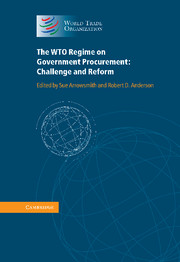Book contents
- Frontmatter
- Contents
- List of contributors
- Foreword by Pascal Lamy
- Perspective of the Chairman of the WTO Committee on Government Procurement, Nicholas Niggli (Switzerland)
- Preface
- Disclaimer
- PART I The WTO regime on government procurement
- PART II Expanding the scope of the Agreement on Government Procurement: accession and coverage
- 2 Forging a more global procurement market: issues concerning accessions to the Agreement on Government Procurement
- 3 Accession to the Agreement on Government Procurement: the case of China
- 4 India's possible accession to the Agreement on Government Procurement: what are the pros and cons?
- 5 The benefits for developing countries of accession to the Agreement on Government Procurement: the case of Chinese Taipei
- 6 The coverage negotiations under the Agreement on Government Procurement: context, mandate, process and prospects
- 7 Canada's sub-central government entities and the Agreement on Government Procurement: past and present
- 8 The procurement of state trading enterprises under the WTO Agreements: a proposal for a way forward
- 9 Addressing purchasing arrangements between public sector entities: what can the WTO learn from the EU's experience?
- PART III Revision of the procedural rules and other transparency provisions of the Agreement on Government Procurement
- PART IV Developing countries in the WTO procurement regime
- PART V Economic and social development (horizontal policies) in government procurement
- PART VI Enforcement and remedies
- PART VII Multilateralism and regionalism
- PART VIII Challenges and new directions
- Index
- References
9 - Addressing purchasing arrangements between public sector entities: what can the WTO learn from the EU's experience?
from PART II - Expanding the scope of the Agreement on Government Procurement: accession and coverage
Published online by Cambridge University Press: 07 September 2011
- Frontmatter
- Contents
- List of contributors
- Foreword by Pascal Lamy
- Perspective of the Chairman of the WTO Committee on Government Procurement, Nicholas Niggli (Switzerland)
- Preface
- Disclaimer
- PART I The WTO regime on government procurement
- PART II Expanding the scope of the Agreement on Government Procurement: accession and coverage
- 2 Forging a more global procurement market: issues concerning accessions to the Agreement on Government Procurement
- 3 Accession to the Agreement on Government Procurement: the case of China
- 4 India's possible accession to the Agreement on Government Procurement: what are the pros and cons?
- 5 The benefits for developing countries of accession to the Agreement on Government Procurement: the case of Chinese Taipei
- 6 The coverage negotiations under the Agreement on Government Procurement: context, mandate, process and prospects
- 7 Canada's sub-central government entities and the Agreement on Government Procurement: past and present
- 8 The procurement of state trading enterprises under the WTO Agreements: a proposal for a way forward
- 9 Addressing purchasing arrangements between public sector entities: what can the WTO learn from the EU's experience?
- PART III Revision of the procedural rules and other transparency provisions of the Agreement on Government Procurement
- PART IV Developing countries in the WTO procurement regime
- PART V Economic and social development (horizontal policies) in government procurement
- PART VI Enforcement and remedies
- PART VII Multilateralism and regionalism
- PART VIII Challenges and new directions
- Index
- References
Summary
Introduction
While public procurement typically involves public sector entities acquiring supplies, works and services from the private sector, public sector entities may themselves become the suppliers in public procurement for various reasons. To give some examples:
A municipal hospital may acquire maintenance services from the engineering department of the same municipality for convenience, a typical in-house provision;
Central government ministries may be obliged to procure financial services from the designated state-owned bank which enjoys exclusive statutory right to provide such services;
Government agencies may be instructed to procure from central purchasing bodies in order to leverage the government's aggregate buying power and simplify procurement of commonly used goods and services;
As a form of local government reorganization and outsourcing to improve management and governance, a municipality may acquire refuse collection and waste disposal services from a separate public body set up by it individually or jointly with other municipalities to take advantage of economies of scale; or
A state-run university may want to purchase buses from a state-owned manufacturer simply because it offers better value for money in comparison with private suppliers.
These purchasing arrangements between public sector entities give rise to a number of legal issues that need to be addressed, often collectively, by procurement, competition and state aid rules. The primary concern for procurement regulation is the coverage of such arrangements: whether they fall under the definition of covered procurement in the first place.
- Type
- Chapter
- Information
- The WTO Regime on Government ProcurementChallenge and Reform, pp. 252 - 282Publisher: Cambridge University PressPrint publication year: 2011
References
- 3
- Cited by



